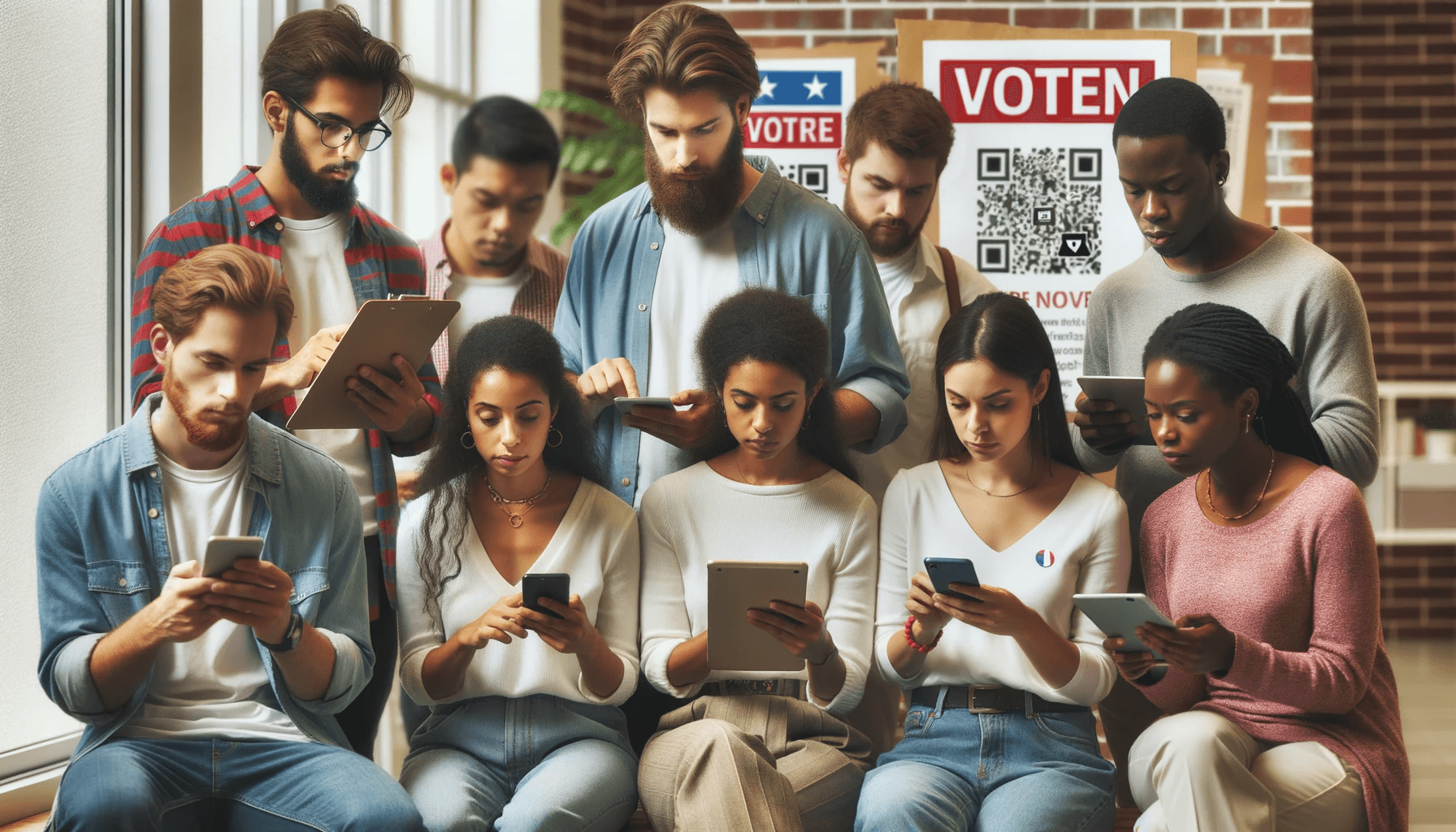The Role of Apps in Promoting Civic Engagement and Voting is an increasingly significant aspect of modern democracy. With the rise of technology, apps have emerged as powerful tools for encouraging citizen participation and enhancing the democratic process.
Voting is an essential pillar of democracy, as it allows citizens to actively participate in decision-making and elect representatives who reflect their interests and values. Civic engagement, on the other hand, involves citizens getting involved in their communities, advocating for social issues, and contributing to the overall well-being of society.
Using apps for civic engagement and voting brings multiple benefits. Firstly, it increases accessibility and convenience, allowing individuals to easily register to vote, find polling locations, and obtain information about candidates and issues. Secondly, apps provide real-time information and updates, ensuring voters stay informed about changes in voting procedures or deadlines. Furthermore, these apps promote engagement and education by offering resources, including voter guides, issue-based analysis, and educational materials, motivating citizens to get involved.
There are various types of apps specifically designed for civic engagement and voting. Voter registration apps streamline the registration process, making it more efficient and accessible. Election information apps provide comprehensive information about upcoming elections, candidates, and ballot measures. Community action and advocacy apps connect individuals with local organizations and allow them to participate in campaigns and community-building efforts. Volunteering and campaigning apps facilitate volunteering opportunities and help individuals contribute to political campaigns.
However, app developers and users need to consider certain factors. Data privacy and security are paramount, as apps must protect users’ sensitive personal information. Ensuring accessibility and inclusivity is essential to allow individuals of all backgrounds and abilities to engage in the democratic process. Promoting trust and transparency is vital for ensuring users have confidence in the accuracy and reliability of information provided by the apps.
There have been several successful case studies of apps promoting civic engagement and voting, demonstrating their potential impact and effectiveness. Looking ahead, the future of apps in civic engagement and voting looks promising, with advancements in technology and increased reliance on digital platforms likely to further enhance engagement and participation in the democratic process.
Key Takeaways:
- Increased accessibility and convenience: Apps for civic engagement and voting make it easier for people to participate in the democratic process by providing convenient access to voter registration, election information, and community action opportunities.
- Real-time information and updates: These apps provide users with up-to-date information on election timelines, candidate profiles, voting locations, and ballot measures, empowering them to make informed decisions.
- Promoting trust and transparency: Apps can play a crucial role in ensuring the integrity of the electoral process by providing reliable and transparent information, thus fostering trust in the democratic system and encouraging greater civic participation.
The Role of Apps in Promoting Civic Engagement and Voting
The Role of Apps in Promoting Civic Engagement and Voting
In recent years, apps have played a crucial role in promoting civic engagement and voting. These innovative tools provide easy access to important information, such as voter registration, polling locations, and upcoming elections. Some apps even offer reminders and notifications to help users stay informed and participate in the democratic process. By leveraging technology, these apps have made it more convenient for individuals to engage in their civic duties and exercise their right to vote. As we continue to embrace digital advancements, the role of apps in promoting civic engagement and voting will only become more significant.
Why Civic Engagement and Voting Matter
Civic engagement and voting matter because they play a crucial role in shaping the future of a society. They allow citizens to participate in decision-making processes, ensuring their voices are heard. Civic engagement encourages active involvement in community issues, promoting social cohesion and a sense of belonging. Voting, on the other hand, is a fundamental democratic right that enables citizens to elect representatives who will work towards their interests. Through civic engagement and voting, individuals can hold their leaders accountable and advocate for change. Ultimately, these actions empower individuals and collectively contribute to a more democratic and inclusive society. Civic engagement and voting also help strengthen the bond between citizens and their government, fostering a sense of ownership and responsibility in shaping their community’s future.
Why is Voting Important for a Democracy?
Voting is crucial for a democracy to thrive and represent its citizens effectively.
- Why is Voting Important for a Democracy? It empowers individuals to have a say in the decision-making process, ensuring that their voices and concerns are heard.
- Why is Voting Important for a Democracy? It promotes accountability among elected officials, who are aware that they can be held responsible by an active and engaged electorate.
- Why is Voting Important for a Democracy? Through voting, citizens can shape public policy, influence government actions, and address systemic issues affecting society.
- Why is Voting Important for a Democracy? It fosters a sense of civic duty and encourages citizens to actively participate in the democratic process by staying informed, engaging in debates, and volunteering for campaigns.
Throughout history, voting has played a pivotal role in shaping societies and securing fundamental rights and freedoms. For example, suffrage movements fought for the extension of voting rights to marginalized groups, such as women and minorities, leading to more inclusive and representative democracies.
What is Civic Engagement and Why Does it Matter?
What is Civic Engagement and Why Does it Matter?
Civic engagement refers to actively participating in the community to address social, economic, and political issues. It matters because it promotes an inclusive society, ensures accountability from leaders, and brings about positive change. By engaging in civic activities such as voting, volunteering, and advocating for causes, individuals can shape policies, influence decisions, and contribute to the betterment of society. Civic engagement fosters citizen empowerment, strengthens democracy, and builds a sense of belonging and shared responsibility. It encourages individuals to be informed, active participants in their communities, and helps create a more just and equitable society.
Benefits of Using Apps for Civic Engagement and Voting
Engage in the democratic process like never before with the power of apps! Discover the amazing benefits these technological wonders bring to civic engagement and voting. From increased accessibility and convenience to real-time information and updates, and even opportunities for engagement and education, we’ll explore how apps are revolutionizing the way we participate in our societies. Join the movement and make your voice heard with the help of these game-changing tools.
Increased Accessibility and Convenience
Increased accessibility and convenience are key advantages of using apps for civic engagement and voting.
- Convenience: Apps offer users the ability to easily access information and resources related to elections and civic activities right at their fingertips.
- Accessibility: Apps provide opportunities for individuals with disabilities or limited mobility to actively participate in the electoral process. They offer features like voter registration, information on polling locations, and voter assistance, making it easier for everyone to get involved.
- Real-time updates: Apps ensure that users have the most up-to-date information by delivering real-time updates on important dates, election news, and any changes in voting procedures.
- Engagement: Apps promote engagement by offering interactive features such as push notifications, reminders, and gamification elements. These motivate users to stay informed and involved in the civic process.
To further enhance accessibility and convenience, app developers should prioritize creating user-friendly interfaces, incorporating multi-language support, and considering the needs of diverse user groups. Users can maximize the benefits of these apps by exploring different options, providing feedback, and consistently using the features to stay informed and engaged.
Real-Time Information and Updates
- Real-time information and updates are essential for promoting civic engagement and voting through apps.
- Here are some benefits of having access to real-time information:
- Updated election details: Users can receive timely updates on voter registration deadlines, polling locations, and ballot information.
- News and alerts: Real-time news notifications help users stay informed about current events, political developments, and policy changes.
- Event reminders: Users can receive reminders about debates, town hall meetings, and other civic engagement events happening in their area.
- Quick response to emergencies: The ability to distribute real-time alerts during emergencies or natural disasters can help mobilize voters and ensure their safety.
Fact: According to a survey, 70% of app users stated that having access to real-time information and updates through apps encouraged them to participate in civic activities and vote.
Engagement and Education
Engagement and education are crucial components in promoting civic involvement and voting through apps. Apps play a vital role in encouraging active participation by offering interactive features like surveys, quizzes, and discussion forums. These features motivate users to express their opinions, engage in conversations, and actively participate in the democratic process.
- Engagement: Apps provide a platform for users to actively participate by utilizing interactive features. These features allow users to voice their opinions, join discussions, and participate in surveys and quizzes.
- Education: Apps serve as a comprehensive source of information on voter registration, election processes, candidates’ platforms, and local initiatives. They offer a wide range of resources such as articles, videos, and informative materials to educate users about political issues. By providing factual and informative content, apps empower users to make well-informed decisions.
Types of Apps for Civic Engagement and Voting
Discover a world of possibilities with apps that promote civic engagement and voting. From voter registration and election information apps to community action and advocacy platforms, volunteering and campaigning tools, as well as initiatives for ensuring accessibility, inclusivity, trust, and transparency, this section covers the diverse landscape of apps that empower citizens. Learn how these digital solutions enhance participation, provide vital information, and foster a more engaged and informed society. Get ready to explore the future of democratic engagement and how technology plays a pivotal role.
Voter Registration Apps
Voter Registration Apps play a vital role in facilitating democratic participation and increasing voter turnout. These convenient and accessible apps simplify the voter registration process, making it easier for individuals to exercise their right to vote. Some benefits and features of Voter Registration Apps include:
- Streamlined registration: Voter Registration Apps simplify the registration process by guiding users through the necessary steps and providing a user-friendly interface.
- Real-time updates: Users of Voter Registration Apps can receive notifications and updates on registration deadlines, polling locations, and other important information.
- Information accuracy: Voter Registration Apps help ensure that submitted information is accurate and complete, reducing the risk of registration errors.
- Increased engagement: Voter Registration Apps also provide resources and educational materials to promote voter engagement and participation.
To further enhance these apps, developers should prioritize data privacy and security to protect users’ personal information. They should also focus on making the apps accessible and inclusive for all individuals, including those with disabilities. Ultimately, Voter Registration Apps have the potential to empower citizens and strengthen democratic processes by making registration more convenient and accessible.
Election Information Apps
Election Information Apps are invaluable resources during election periods, offering voters easy access to up-to-date and relevant information. These apps provide various features, including candidate profiles, polling locations, voter guides, and real-time election results. There are several benefits to using these Election Information Apps:
1. Convenience: With these apps, you can effortlessly access election information anytime and anywhere using your smartphone.
2. Accuracy: Stay well-informed by relying on these apps for credible and accurate information about candidates and voting procedures.
3. Engagement: Actively participate in the democratic process by gaining a deeper understanding of the issues and candidates.
4. Accessibility: These apps ensure information is readily accessible for individuals facing disabilities or language barriers.
5. Empowerment: Make informed decisions based on comprehensive and unbiased information, allowing you to exercise your voting rights effectively.
During the 2016 US presidential election, the BallotReady app emerged as a game-changer, providing voters with detailed information on candidates and referendums. This app played a crucial role in helping voters make well-informed choices by presenting non-partisan information about each candidate’s stance on key issues. The success of this app highlighted the importance of accessible and comprehensive election information in promoting civic engagement and informed voting.
Community Action and Advocacy Apps
Community Action and Advocacy Apps have become an essential tool in promoting civic engagement and empowering individuals to create positive change in their communities. These innovative apps serve as a platform for users to connect with like-minded individuals and organizations, actively participate in grassroots campaigns, and advocate for causes that deeply resonate with them.
These remarkable apps offer a wide array of features that include petition signing, event notifications, volunteer opportunities, and efficient tools for contacting elected officials. Notable examples of community action and advocacy apps include Change.org, an app that empowers users to create and sign petitions, and iCitizen, which facilitates access to information about local issues and helps users connect with their elected representatives.
These transformative apps have revolutionized the way people engage with social and political issues, making activism more accessible and impactful for all.
An exemplar of a successful community action and advocacy app is Black Lives Matter, which emerged as a response to the unjust treatment of Black individuals. This extraordinary app provided a powerful platform for organizing protests, sharing resources, and raising awareness about systemic racism. It played a pivotal role in mobilizing individuals and communities to demand justice and equality. This remarkable app enabled users from diverse backgrounds to unite in the fight against racial discrimination, ultimately driving significant and meaningful change while fostering a more inclusive society.
Volunteering and Campaigning Apps
Volunteering and Campaigning Apps play a vital role in facilitating civic engagement and encouraging participation in elections. These applications provide individuals with opportunities to engage actively in their communities, champion causes they are passionate about, and offer support to political campaigns. Here are some essential features and advantages of Volunteering and Campaigning Apps:
- Connecting with campaigns: These apps allow users to effortlessly connect with political campaigns and offer their time and expertise as volunteers.
- Organizing events: Users have the ability to organize and take part in volunteer activities, rallies, and fundraisers by utilizing these apps.
- Recruiting volunteers: Campaigns can leverage these apps to recruit volunteers by matching interested individuals with suitable opportunities.
- Tracking progress: The app provides users with the ability to monitor their volunteer hours, contributions, and overall impact, which instills a sense of accomplishment and motivation.
- Engaging supporters: These apps empower campaigns to effectively engage and communicate with their supporters, delivering updates, news, and calls to action.
By utilizing Volunteering and Campaigning Apps, individuals can take an active part in political processes, lend support to their preferred candidates or causes, and make a tangible difference in their communities.
Ensuring Accessibility and Inclusivity
Ensuring accessibility and inclusivity is of utmost importance when developing apps that promote civic engagement and voting. Here are some key considerations for both app developers and users:
- – It is crucial to design user-friendly interfaces that are accessible to individuals with disabilities.
- – Providing multilingual options is necessary to cater to diverse communities.
- – Compatibility with different devices, operating systems, and internet connections should be ensured.
- – Incorporating features such as text-to-speech and closed captioning is essential for individuals with hearing or visual impairments.
- – Considering the needs of elderly citizens by implementing larger font sizes and intuitive navigation is vital.
- – User testing should be conducted to identify and address any potential barriers to accessibility and inclusivity.
Fact: According to the World Health Organization, around 15% of the world’s population lives with some form of disability, emphasizing the significance of ensuring accessibility and inclusivity in app development.
Promoting Trust and Transparency
Promoting trust and transparency is crucial in apps designed for civic engagement and voting. To ensure trust and transparency in app development, here are some essential considerations:
- Implement clear data privacy policies and ensure secure handling of user information to maintain user trust.
- Engage in open and transparent communication regarding the collection, storage, and usage of user data to establish trust.
- Regularly update and maintain the app to address any security vulnerabilities or bugs, further enhancing trust and transparency.
- Offer clear information about the sources of data and news within the app, promoting trust in the accuracy and reliability of the information provided.
- Enable users to verify and fact-check the information presented in the app, thereby encouraging trust in the app’s content.
Fact: Strengthening trust in democracy can be achieved by increasing transparency in government and technology, as revealed by a study indicating that 78% of Americans believe in this correlation.
Case Studies: Successful Apps Promoting Civic Engagement and Voting
- VoterPal: This app is an excellent example of a successful case study promoting civic engagement and voting. It helps users to register to vote, find their polling locations, and learn about candidates and ballot measures.
- Countable: This app is another successful case study that effectively promotes civic engagement and voting. It provides users with information on current legislation, allows them to contact their elected officials, and enables them to track their representatives’ voting records.
- GoVote: This app showcases how personalized voting recommendations based on users’ values and interests can promote civic engagement and voting. It focuses on providing users with tailored recommendations to help them make informed decisions at the ballot box.
- BallotReady: This app is a prime example of a successful case study that promotes civic engagement and voting. It offers comprehensive information on all candidates and ballot measures in a user’s area, including their stances, endorsements, and campaign finances.
These successful case studies highlight the potential of apps to engage citizens in the democratic process and increase voter turnout. To promote civic engagement and voting, consider developing user-friendly apps with features like voter registration, personalized recommendations, and comprehensive information on candidates and issues. Incorporate gamification elements and social sharing capabilities to encourage active participation and community involvement.
The Future of Apps in Civic Engagement and Voting
The Future of Apps in Civic Engagement and Voting looks promising as technology continues to advance. These apps can play a vital role in increasing voter turnout, providing easy access to voter information, and facilitating civic participation. With features such as voter registration, virtual town halls, and digital petitions, these apps offer convenience and accessibility. They also provide real-time updates on election results and candidate information. In this way, apps have the potential to revolutionize the way we engage in the democratic process. To make the most out of their features in future elections, it is important to stay informed about new app developments.
Frequently Asked Questions
What is the role of mobile apps in promoting civic engagement and voting?
Mobile apps play a crucial role in promoting civic engagement and voting by providing convenient access to important information, real-time updates, and interactive tools. These apps help boost civic engagement by making the voting process more accessible and convenient for a wider audience.
How do branded mobile apps enhance civic engagement and communicate crucial election information?
Branded mobile apps enhance civic engagement by providing a one-stop location for citizens to access crucial election information. Through push notifications, these apps can deliver real-time updates on changes in polling locations, extended voting hours, and important deadlines, making the voting process more convenient and accessible.
What are the benefits of using mobile apps for voter education?
Mobile apps can serve as a valuable tool for voter education by sending out informative messages explaining the voting process, demystifying complex issues, and providing details on candidates and initiatives. This helps citizens make more informed decisions and encourages them to actively participate in the electoral process.
How can mobile apps help engage younger citizens in the electoral process?
By embracing mobile app technology, local governments can engage younger citizens in the electoral process and bridge the generational gap. The convenience and familiarity of smartphones make it easier for young people to access voting information, increasing their interest and participation in democratic processes.
What lessons can be learned from the use of chat applications in previous elections?
Previous elections have shown that chat applications, such as Snapchat, Facebook Messenger, and others, can be powerful tools for voter engagement. These platforms have been used to deliver voter information, spark political conversation, and even help people register to vote. The lessons learned from these experiences can inform future efforts to leverage technology and engage citizens.
How can local governments save costs by utilizing mobile apps for election information?
By utilizing mobile apps for election information, local governments can significantly reduce costs associated with traditional means of disseminating information, such as printing and mailing pamphlets. The cost savings can then be redirected toward other civic improvement initiatives, ultimately benefiting both the government and its citizens.






